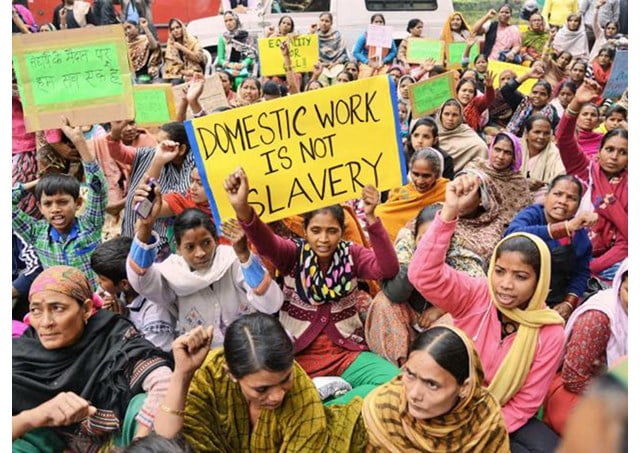India is a land where women breaking the public-private dichotomy and entering the corporate battlefield was accompanied by a rise in the number of domestic workers being hired in the country. These numbers have been on the rise since 1999 and have grown by approximately 120% since liberalization.
There are over 4 million domestic workers in India as of today. Nearly two thirds of this workforce is comprised of women. This is unsurprising because even today, the domestic sphere is considered to be a woman’s domain. However, the problem is not just with the mentality that relegates women to the private spaces of housework, but with the kind of exploitation that is inflicted upon these employees who work in the confines of households.
Inadequate Legal and Policy Framework
The primary reason why the abuse and exploitation of domestic workers remains rampant is due to the lack of legal or regulatory regimes to protect the worker in this informal sector of work. Domestic workers are not considered significant enough components of the labour force and hence, adequate redressal mechanisms in law or policy are absent. This flows from the idea that the home is not and cannot be a work place.
Also read: Unpaid Domestic Labour And The Invisibilisation Of Women’s Work
A direct consequence of this is that domestic workers are not even recognised as ‘workers’ in society – their contribution is not acknowledged to be “productive work” that forms a part of the country’s economic growth. This idea affects women workers even more adversely because their work is merely viewed as an extension of their “inherent duty or responsibility” towards the home and housework. For a long time now, they were labelled “domestic helpers” and not “workers”. This in turn, provides for a work atmosphere which is exploitative and with little scope for any cure.
While inadequacy in laws and policies is one factor that results in the continued exploitation of domestic workers, the other reason for such an unstable work atmosphere is the power dynamic. This, coupled with the absence of any accurate job description results in a situation whereby the worker has to exhibit servitude and obeisance at a level that deprives the individual of any kind of bargaining power.
domestic workers are not even recognised as ‘workers’ in society – their contribution isn’t acknowledged as “productive work”.
Domestic workers are therefore highly underpaid, subjected to harsh working conditions, and are made to work for undefined hours. They are also often subjected to more active forms of exploitation including violence, sexual harassment, and forced migration. The maltreatment of these workers heightens every time something goes amiss in the household for they are constantly under supervision. Any kind of lost goods or items cause these workers to be at the receiving end of intimidation, police threats, physical violence or even dismissal; a classic example of the ‘criminalization of poverty’.
There have been news reports revealing the inhuman treatment meted out to these workers. The incident concerning Zohra Bibi, who was a domestic worker in the National Capital Region (NCR) is a case in point. She was found in an unconscious state in the basement after being physically assaulted under a suspicion of thievery.
Zohra Bibi, a victim of violence at the hands of her employees has shed light on the conditions that domestic workers in the country are subjected to. In an interview, she said, “If I could, I would have preferred to live in my village. Here, we live like dogs. When you leave your village and come to Delhi, you are a dog. You aren’t a human. You are treated like a dog if you are a domestic worker. Our employers think we don’t have anything to do. That we don’t eat, drink, or wear anything”.
Current Framework
In tandem with the idea of such work not being productive or “labour”, is the fact that labour legislations in India do not cater to domestic workers. There was an attempt to bring about a specific legislation meant for domestic workers by the National Commission for Women. This was the Domestic Workers Welfare and Social Security Act, 2010, but the Bill was never passed.
In 2016, Mr. Shashi Tharoor introduced the Domestic Workers’ Welfare Bill, 2016. This Bill too has not seen execution and so there exists no statute or legislation applicable to domestic workers per se.
labour laws in India do not cater to domestic workers.
The Labour and Skills Department has revised the wage rate for household workers and set it at ₹37.50 for every one hour of domestic chores such as cleaning, cooking etc. The wage rate varies for other kinds of work such as baby-sitting and taking care of the elderly. Some states however, such as Rajasthan, Karnataka and Tamil Nadu have fixed minimum wages for these workers. For instance, Rajasthan has set the minimum wage rate at a sum of ₹5642 per month.
While this is a step in the right direction, it is important to understand that in the absence of a proper grievance-redressal mechanism, violations would continue to occur. Merely fixing a minimum wage, which in most of these states has anyway been set at an arbitrary amount, and is not conducive to the high costs of living in urban cities, is not sufficient. Issues of violence and abuse will continue to crop up.
A possible recourse would then be to approach the Courts for the violation of fundamental rights. However, most domestic workers lack the agency or resources to resort to such a mechanism. The Courts and overall justice in the country are not particularly accessible to begin with.
The avenue that has proved to be most beneficial for domestic workers in our country then, has been unions and collective action. A number of such collective action units exist in different states and have helped address these problems faced by domestic workers. These unions have been demanding better working conditions and better wages. They also take recourse to law enforcement agencies in the event of violence and abuse. Their success so far has hinged on people’s extreme dependence on these “domestic helps” without which it becomes particularly difficult for working women to manage their households. Hence, they succumb to demands by the unions.
The avenue that has proved to be most beneficial for domestic workers has been unions and collective action.
However, even these unions have struggled to gain status as trade unions, making a lot of their demands unenforceable. It was only recently that the Paschimbanga Griha Paricharika Samit (West Bengal Domestic Workers Society) received a certificate declaring them a trade union from the state government. Such a move is extremely welcome, for it provides a much better legal footing to these collective action units, who can expect better bargaining power as trade unions, which are recognized under labour legislations.
All in all, the situation remains unacceptable. Exploitation of these workers continues and the law is still not equipped to deal with the specific problems that arise in this sphere of work. There is a need for specific legislation on the subject as well as greater debate and discourse on the issue. Only then can we expect better inclusion of these workers into the ‘economy’ and assure dispensation of justice for this class of workers.
Also read: SEWA: Making Women Self Sufficient Since The ’70s
References
- Challenges associated with domestic workers in India – The Hans India
- Living on the margins of development: Domestic women workers – MPRA
- It’s not help, it’s work – The Hindu
- 47.5 lakh domestic workers set to get legal status and minimum wages – Economic Times
- India’s domestic workers face abuse without legal protection – The News Minute
- Inside the miserable world of India’s domestic workers – Rediff.com
- India’s domestic workers at risk from ‘toxic relationship’ with employer – Reuters
- My home, my maid’s prison: The state of domestic workers in India – Wion
Featured Image Source: Qrius
About the author(s)
Yashvi is a corporate lawyer based out of Delhi.



